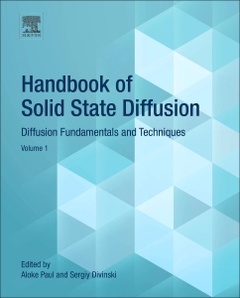Handbook of Solid State Diffusion: Volume 1 Diffusion Fundamentals and Techniques
Coordonnateurs : Paul Aloke, Divinski Sergiy

Handbook of Solid State Diffusion, Volume 1: Diffusion Fundamentals and Techniques covers the basic fundamentals, techniques, applications, and latest developments in the area of solid-state diffusion, offering a pedagogical understanding for students, academicians, and development engineers. Both experimental techniques and computational methods find equal importance in the first of this two-volume set.
Volume 1 covers the fundamentals and techniques of solid-state diffusion, beginning with a comprehensive discussion of defects, then different analyzing methods, and finally concluding with an exploration of the different types of modeling techniques.
1. Types of Defects, Driving Forces, and Diffusion in Solids 2. Tracer Diffusion and Understanding the Atomic Mechanisms of Diffusion 3. Diffusion Couple Techniques in Binary and Pseudo-Binary Systems 4. Diffusion in Multicomponent Systems 5. Point Defects and Diffusion in Semiconductors 6. CALPHAD-Type Modeling of Diffusion Kinetics in Multicomponent Alloys 7. Phase-field modeling as a method relevant for modeling solid-state phase formation during interdiffusion 8. Thermodynamic treatment of diffusive phase transformations: Reactive diffusion 9. Monte Carlo methods in diffusion 10. Defects and Diffusion mechanisms in ordered phases
Professor Dr. Sergiy Divinski leads the radiotracer laboratory at the Institute of Materials Physics, University of Münster, Germany. The research activities are concentrated on kinetic and thermodynamic properties of interfaces in solids, including intergranular and interphase boundaries. Other major interests include diffusion phenomena in intermetallic compounds, effects of ordering on diffusion kinetic and diffusion mechanisms, interfaces in severely deformed materials. He teaches graduate and postgraduate courses on Diffusion in Solids, Numerical methods in Material Science and different aspects of Materials Science. He has co-authored more than 150 articles in various international journals, several book chapters in th
- Presents a handbook with a short mathematical background and detailed examples of concrete applications of the sophisticated methods of analysis
- Enables readers to learn the basic concepts of experimental approaches and the computational methods involved in solid-state diffusion
- Covers bulk, thin film, and nanomaterials
- Introduces the problems and analysis in important materials systems in various applications
- Collates contributions from academic and industrial problems from leading scientists involved in developing key concepts across the globe
Date de parution : 04-2017
Ouvrage de 548 p.
19x23.3 cm
Thème de Handbook of Solid State Diffusion: Volume 1 :
Mots-clés :
diffusion; solid-state reactions; Tracer diffusion; binary systems; Pseudo-Binary Systems; multicomponent diffusion; diffusion kinetics; stress-strain diffusion; atomic transport; reactive diffusion; triple joints diffusion; thermo-dynamic kinetic method; thermomigration; electromigration; ion transport
